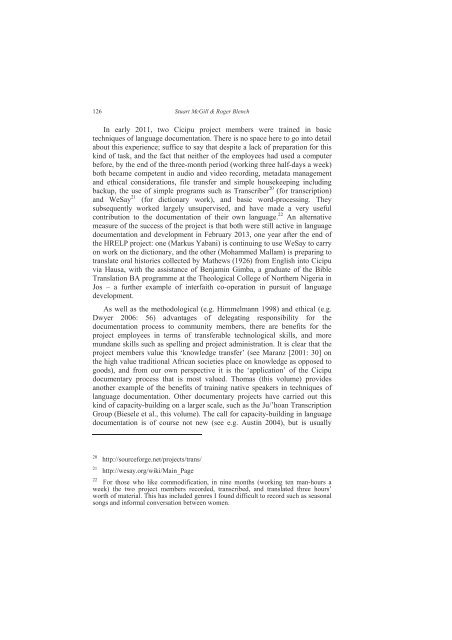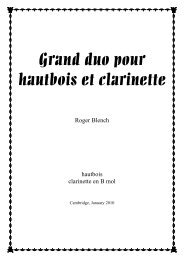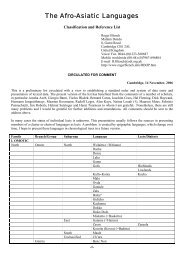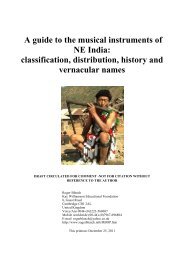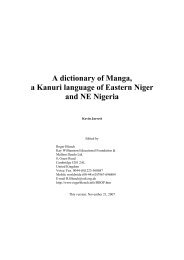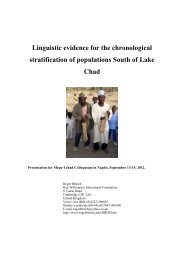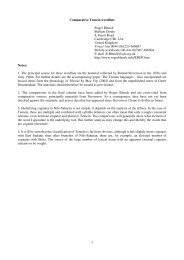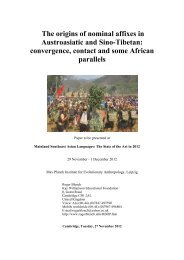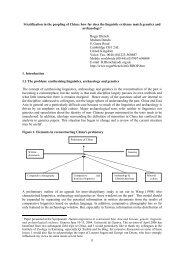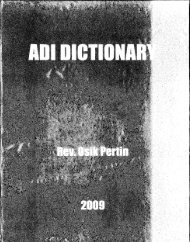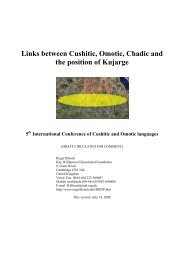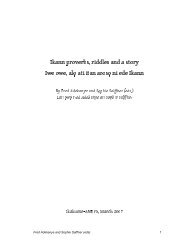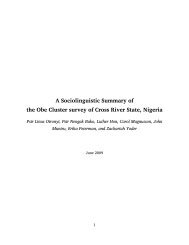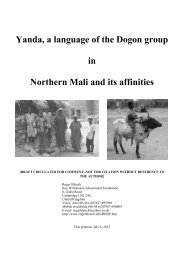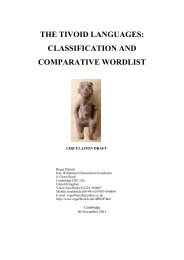Documentation, development, and ideology in the ... - Roger Blench
Documentation, development, and ideology in the ... - Roger Blench
Documentation, development, and ideology in the ... - Roger Blench
Create successful ePaper yourself
Turn your PDF publications into a flip-book with our unique Google optimized e-Paper software.
126<br />
Stuart McGill & <strong>Roger</strong> <strong>Blench</strong><br />
In early 2011, two Cicipu project members were tra<strong>in</strong>ed <strong>in</strong> basic<br />
techniques of language documentation. There is no space here to go <strong>in</strong>to detail<br />
about this experience; suffice to say that despite a lack of preparation for this<br />
k<strong>in</strong>d of task, <strong>and</strong> <strong>the</strong> fact that nei<strong>the</strong>r of <strong>the</strong> employees had used a computer<br />
before, by <strong>the</strong> end of <strong>the</strong> three-month period (work<strong>in</strong>g three half-days a week)<br />
both became competent <strong>in</strong> audio <strong>and</strong> video record<strong>in</strong>g, metadata management<br />
<strong>and</strong> ethical considerations, file transfer <strong>and</strong> simple housekeep<strong>in</strong>g <strong>in</strong>clud<strong>in</strong>g<br />
backup, <strong>the</strong> use of simple programs such as Transcriber 20 (for transcription)<br />
<strong>and</strong> WeSay 21 (for dictionary work), <strong>and</strong> basic word-process<strong>in</strong>g. They<br />
subsequently worked largely unsupervised, <strong>and</strong> have made a very useful<br />
contribution to <strong>the</strong> documentation of <strong>the</strong>ir own language. 22 An alternative<br />
measure of <strong>the</strong> success of <strong>the</strong> project is that both were still active <strong>in</strong> language<br />
documentation <strong>and</strong> <strong>development</strong> <strong>in</strong> February 2013, one year after <strong>the</strong> end of<br />
<strong>the</strong> HRELP project: one (Markus Yabani) is cont<strong>in</strong>u<strong>in</strong>g to use WeSay to carry<br />
on work on <strong>the</strong> dictionary, <strong>and</strong> <strong>the</strong> o<strong>the</strong>r (Mohammed Mallam) is prepar<strong>in</strong>g to<br />
translate oral histories collected by Ma<strong>the</strong>ws (1926) from English <strong>in</strong>to Cicipu<br />
via Hausa, with <strong>the</strong> assistance of Benjam<strong>in</strong> Gimba, a graduate of <strong>the</strong> Bible<br />
Translation BA programme at <strong>the</strong> Theological College of Nor<strong>the</strong>rn Nigeria <strong>in</strong><br />
Jos – a fur<strong>the</strong>r example of <strong>in</strong>terfaith co-operation <strong>in</strong> pursuit of language<br />
<strong>development</strong>.<br />
As well as <strong>the</strong> methodological (e.g. Himmelmann 1998) <strong>and</strong> ethical (e.g.<br />
Dwyer 2006: 56) advantages of delegat<strong>in</strong>g responsibility for <strong>the</strong><br />
documentation process to community members, <strong>the</strong>re are benefits for <strong>the</strong><br />
project employees <strong>in</strong> terms of transferable technological skills, <strong>and</strong> more<br />
mundane skills such as spell<strong>in</strong>g <strong>and</strong> project adm<strong>in</strong>istration. It is clear that <strong>the</strong><br />
project members value this ‘knowledge transfer’ (see Maranz [2001: 30] on<br />
<strong>the</strong> high value traditional African societies place on knowledge as opposed to<br />
goods), <strong>and</strong> from our own perspective it is <strong>the</strong> ‘application’ of <strong>the</strong> Cicipu<br />
documentary process that is most valued. Thomas (this volume) provides<br />
ano<strong>the</strong>r example of <strong>the</strong> benefits of tra<strong>in</strong><strong>in</strong>g native speakers <strong>in</strong> techniques of<br />
language documentation. O<strong>the</strong>r documentary projects have carried out this<br />
k<strong>in</strong>d of capacity-build<strong>in</strong>g on a larger scale, such as <strong>the</strong> Ju/’hoan Transcription<br />
Group (Biesele et al., this volume). The call for capacity-build<strong>in</strong>g <strong>in</strong> language<br />
documentation is of course not new (see e.g. Aust<strong>in</strong> 2004), but is usually<br />
20<br />
21<br />
22<br />
http://sourceforge.net/projects/trans/<br />
http://wesay.org/wiki/Ma<strong>in</strong>_Page<br />
For those who like commodification, <strong>in</strong> n<strong>in</strong>e months (work<strong>in</strong>g ten man-hours a<br />
week) <strong>the</strong> two project members recorded, transcribed, <strong>and</strong> translated three hours’<br />
worth of material. This has <strong>in</strong>cluded genres I found difficult to record such as seasonal<br />
songs <strong>and</strong> <strong>in</strong>formal conversation between women.


